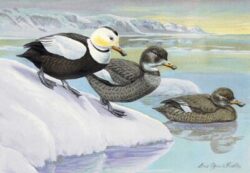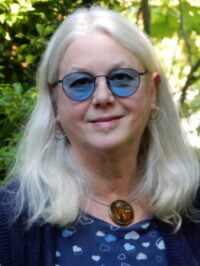#895 Eulogy for vanished creatures
Endlings: A Collection of Poems about Extinct Animals
by Joanna Lilley
Winnipeg: Turnstone Press, 2020
$18.00 / 9780888016898
Reviewed by Heidi Greco
*
 Mary Anning is a name we should recognize, though I’m sure most people don’t. She was the first person (often not credited) to discover ichthyosaur fossils, and did so when she was still a girl of ten or twelve. She’s left her mark, not only on the world, but — most appropriately — on this remarkable book, as one of Anning’s sketches from 1823 serves as its cover illustration.
Mary Anning is a name we should recognize, though I’m sure most people don’t. She was the first person (often not credited) to discover ichthyosaur fossils, and did so when she was still a girl of ten or twelve. She’s left her mark, not only on the world, but — most appropriately — on this remarkable book, as one of Anning’s sketches from 1823 serves as its cover illustration.
Joanna Lilley’s newest book of poems opens with this explanation: “The word ‘endling’ means the last individual of a species or sub-species.” It has not yet been included in the Oxford English Dictionary. It is probably only a matter of time.
The most ominous phrase in that statement is the “only a matter of time” part which, sadly, might apply to any and all species, including us.

The list of creatures she’s written about number more than 60, and include nearly all varieties of living things – insects, birds, fish, mammals. We humans seem to have dealt lethal blows to far too many living things, not to even mention the millions of trees we’ve brought down, a family of beings treated in the poem, “Dendrochronology” which traces the rings in the cross-section of a Douglas fir to the 1300s when that tree’s trunk “…was already thicker than any mammal’s limb.”
Yet this collection isn’t any preachy diatribe with thundering lessons to behold. The poems are, as Lilley’s work always is, beautifully crafted with an amazingly attentive eye to detail, as in the story she weaves about “The Last Labrador Duck”. In it, a young boy sets out on a winter day to find food for his hungry family and spots a duck.
The bird doesn’t stir. Its eyes look closed.
Until now, he’s never wondered if birds
sleep. The bill is orange at the base,
the tip black as a bruised toe.
He tugs a glove off with his teeth
and raises the gun.

It’s not a particularly happy ending — not for the duck nor for the family’s meal — but it’s impossible not to feel part of the scene, almost share the boy’s hunger, experience the vile taste of the bird’s flesh.
Lilley pooh-poohs the notion of being an academic, yet the bibliography of materials she’s consulted in learning about these creatures suggests, at the very least, a sharply inquiring mind. This research imbues each poem with a unique authenticity. In “Great Northern Expedition” she puts herself into the mind of Georg Wilhelm Stellar, a naturalist aboard an ill-fated voyage led by Vitus Bering in 1741. He has salvaged his quill and ink from the doomed ship and writes in his journal, an occupation his fellow seafarers seem to value:
The men save feathers for me now
as they pluck puffins and the biggest cormorants
I’ve ever seen; they will keep me writing
as if I am a talisman. The alphabet is all
that keeps us human; that, and shivering.
In that cold journal, he writes empathetically about the animal he’s discovered (and named after himself), Steller’s sea cow, a mammal that would become “…extinct within twenty-seven years of his discovery.”

One of the more modern extinctions is the enigmatic thylacine, more commonly called the Tasmanian tiger (the last one died at a zoo in Hobart in 1936). Yet occasional sightings continue to be reported, as recently as 2019. Lilley’s poem “If Rain Touched Me” plays on that mystery, and she writes from the point of view of the tiger, as it remembers superstitions and bounties offered, wondering about the videos people keep trying to take of it.
Why did you want me dead so many times
yet now you aim your camera
to shoot me alive?
She doesn’t do much finger-pointing, except at some of her own transgressions, along with one swoop across our collective bow: “Look at us. We know about climate change but we’re still not doing anything about it.” Yet, she expresses a kind of tenderness while seeking out a fossil print, with these lines from “Under and In Front”:
Every understanding happens
more than once. Learning
is a sedimentary process, a layering
of grit and mineral and bone, the kind
of growing knowing she cannot bear:
that feather marks can set
in stone, that water can wear
a planet down to a pebble.

I remember once standing in dinosaur tracks. To get to them, we’d had to walk ten miles across a treeless plain. It was hot. We probably hadn’t prepared very well – brought cameras, but not enough to drink. Yet was the effort worth it? Absolutely. Even my big feet were dwarfed by those prints etched in stone — rocks that had once been mud — where a gargantuan creature had strolled, perhaps seeking food or water, or maybe even a mate.
If what we leave behind turns out to be anything at all, the messages held in the pages of this book offer validation for being here. And despite what might seem grim subject matter, Lilley leaves us with a poem called “It’s Time to Talk of Hope” in which she says:
A koala’s fingerprints are the same as ours.
A starfish, losing an arm, will grow another.
Let us practise our amazement in case
it saves us.
And to that, I can only add, amen.
*

Heidi Greco lives and writes in a house that’s surrounded by a mini-forest. She’s been busy making jars of jam and writing — working on a book about one of her favourite films. Called Glorious Birds: A Celebratory Homage to Harold and Maude, it will be published early in 2021 by Vancouver’s Anvil Press.
*
The Ormsby Review. More Books. More Reviews. More Often.
Publisher and Editor: Richard Mackie
The Ormsby Review is a journal service for in-depth coverage of B.C. books and authors. The Advisory Board consists of Jean Barman, Robin Fisher, Cole Harris, Wade Davis, Hugh Johnston, Patricia Roy, David Stouck, and Graeme Wynn. Scholarly Patron: SFU Graduate Liberal Studies. Honorary Patron: Yosef Wosk. Provincial Government Patron since September 2018: Creative BC
“Only connect.” – E.M. Forster
3 comments on “#895 Eulogy for vanished creatures”